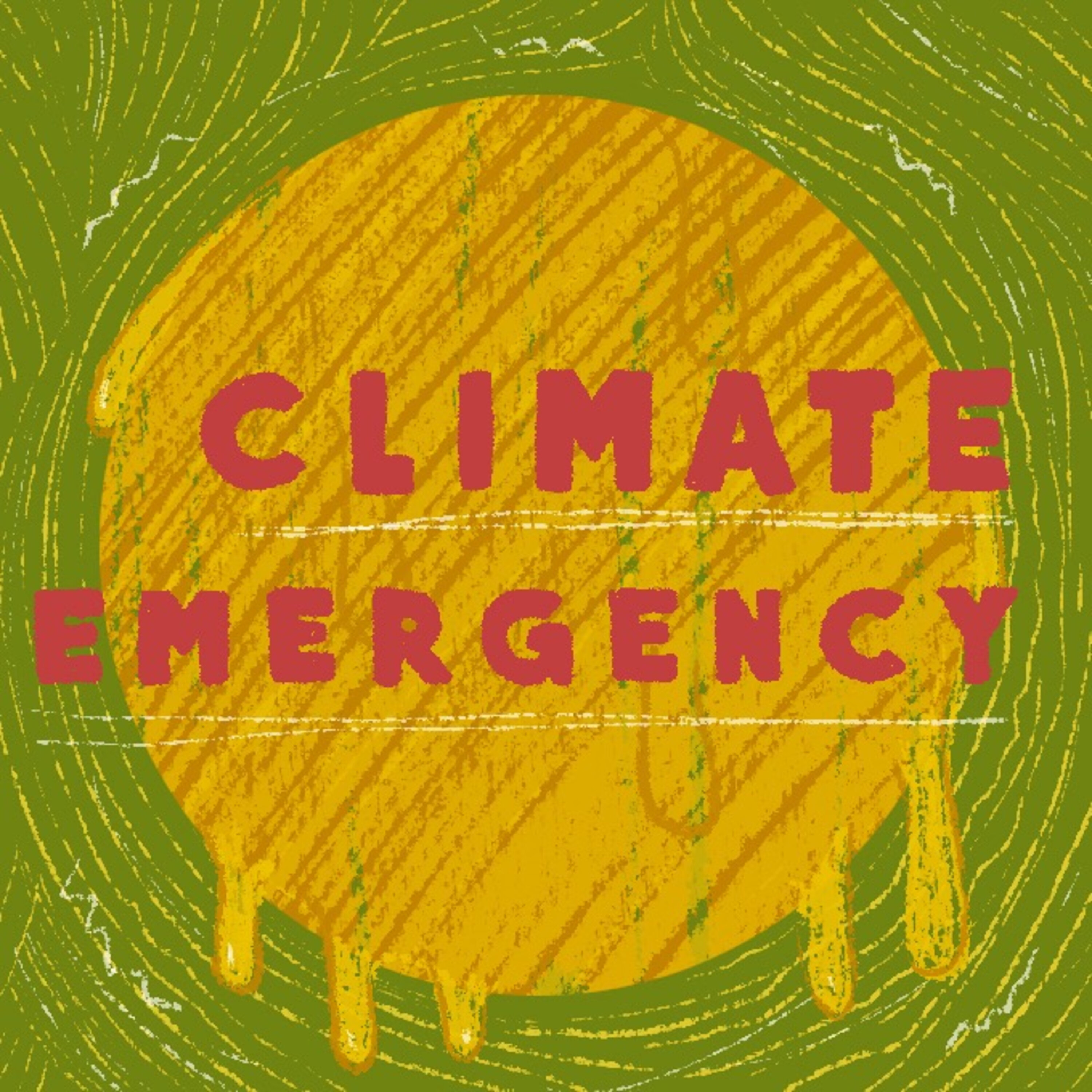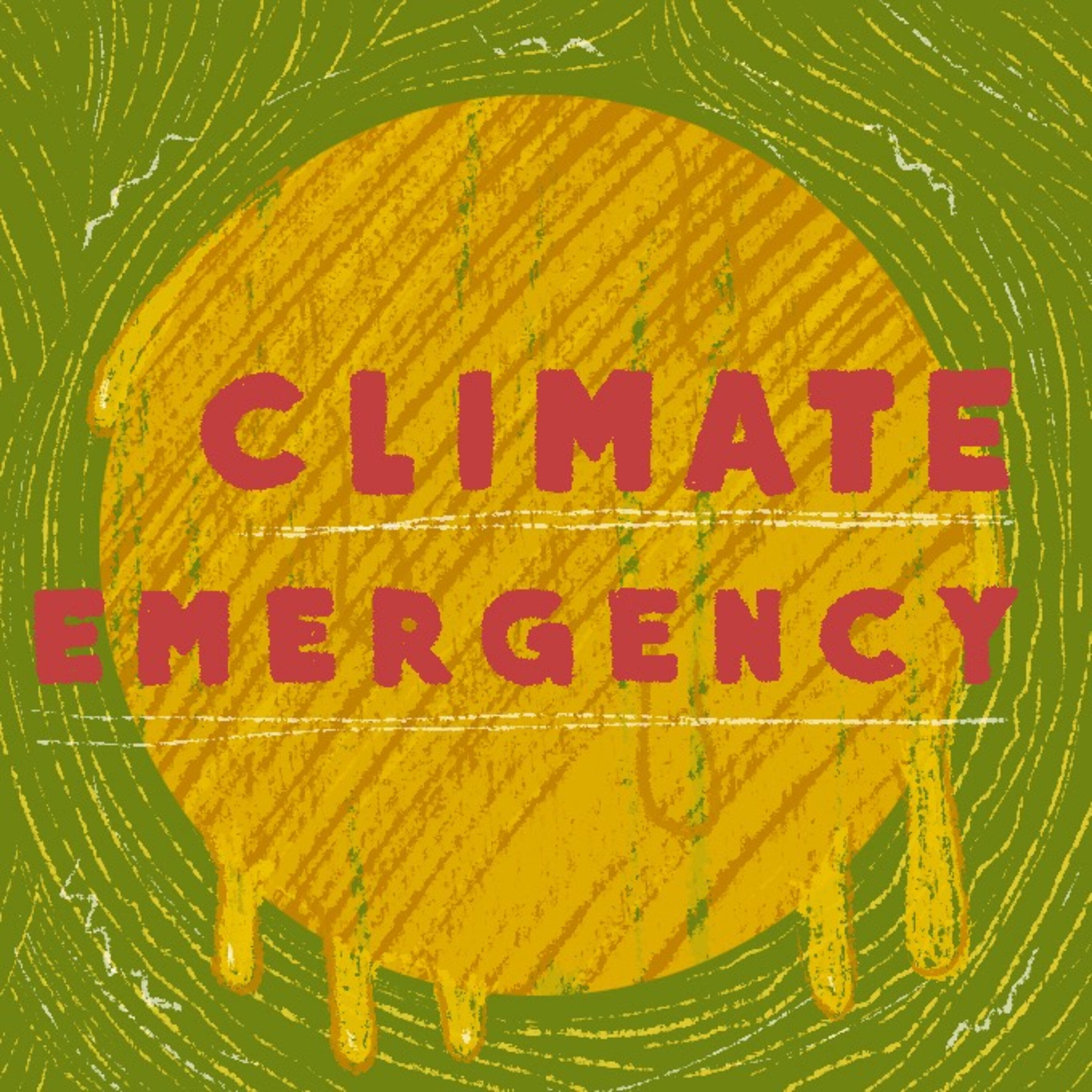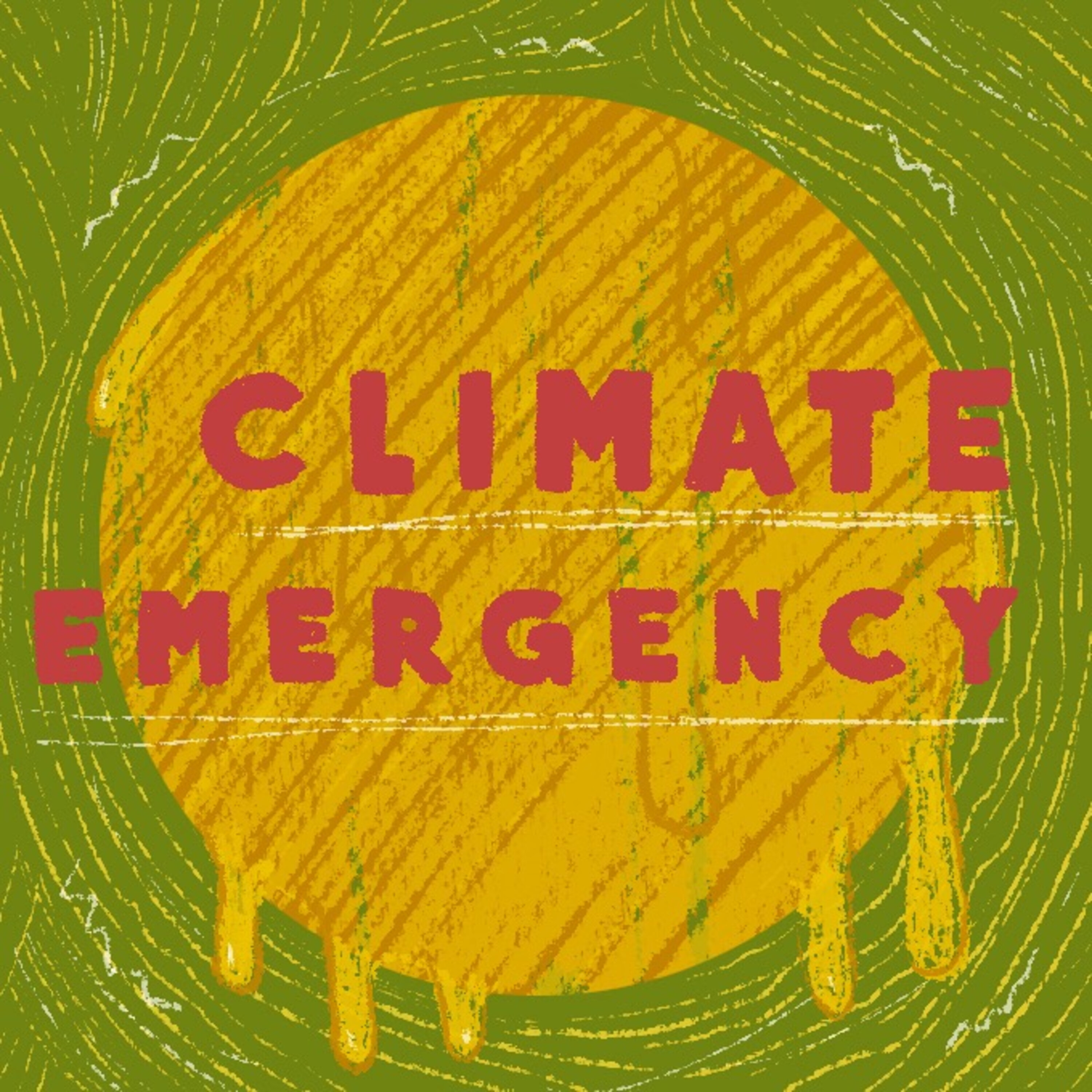Discover Climate Emergency
Climate Emergency

Climate Emergency
Author: Suno India
Subscribed: 59Played: 280Subscribe
Share
© 2024 Suno India
Description
In India, every year, the summers are getting longer, the winters harsher and the downpours intense. Floods in Assam, droughts in Tamil Nadu and growing problem of water scarcity in many states are no longer an abnormality but the new reality!There is an urgency to solve the problems caused by human induced climate change and to understand and find solutions before it is late. This is Climate Emergency and we will bring to fore and discuss the growing impact of climate change. We will also highlight and celebrate climate champions- individuals and communities who are undoing the damage done so far
86 Episodes
Reverse
The cooling industry contributes significantly to global CO2 emissions. As pressure mounts to address climate impacts, there's a crucial need for the industry to overhaul its manufacturing and disposal practices of appliances. But how are your cooling appliances making the climate worse? What exactly is energy efficiency and what makes an appliance energy-efficient? What role can the consumers play? What do they do with their refrigerant-filled equipment once they are done using them?
Suno India’s Sneha Richhariya spoke to Bishal Thapa, senior director at CLASP, an international nonprofit organisation which provides technical and policy support to governments worldwide and works to implement energy efficiency standards and labels for appliances.See sunoindia.in/privacy-policy for privacy information.
On 17th March 2024, the Aam Aadmi Party (AAP) government in the Capital notified the new Delhi Solar Policy, 2024, rolling out larger incentives and subsidies for people to install solar power systems at their homes and businesses. The vision is to make solar energy accessible and affordable for all consumers in Delhi.
In the past months, the government has repeatedly promoted the policy that appears less like an environmental step taken to reduce emissions, but more like a policy to push subsidies and reduce electricity bills. Notably, the policy is being sold to all middle and working-class people. But is it really inclusive? Is it really consumer friendly as the government says? Will the middle class who have access to conventional forms of electricity switch to solar energy? Suno India’s Sneha Richhariya spoke to people in Delhi to understand the complexities of residential rooftop solar adoption.See sunoindia.in/privacy-policy for privacy information.
In early March 2024, the India Meteorological Department (IMD) predicted a hot summer this year, with above-normal temperatures and an above-normal number of heatwave days from March to May.
On 5th March 2024, the World Meteorological Organisation (WMO), a specialised agency of the UN, said in a media release that the 2023-24 El Niño, one of the five strongest on record, has peaked and is gradually weakening — but it will continue to impact climate around the world in the coming months.
We’re playing an episode from last year where Sneha Richhariya explained what El-Nino is, what impact it causes and what is its relation to climate change.See sunoindia.in/privacy-policy for privacy information.
We're seeing what is being called one of the worst droughts in recent years in Karnataka. Bangalore has become unliveable. Bangalore has access to only half the amount of water that it needs on a daily basis. There's no water in many high and mid-rise buildings, gated colonies. The government is rationing out water tankers, construction using the adjacent Kaveri river is banned, new bore wells are being dug and so on.
In this episode of Climate Emergency, Suno India’s Sneha Richhariya speaks to Shreya Nath, who heads the urban water program at Well Labs, which is an environmental research organisation based in Bengaluru. Last year, Well Labs conducted a study on ‘How water flows through Bengaluru?’ to understand where is Bengaluru's water, how much of it is there and in what condition.See sunoindia.in/privacy-policy for privacy information.
Access to clean cooking has been on the radar of policymakers for several decades. With over half of rural households still using traditional, polluting cooking methods, the need for cleaner alternatives is more pressing than ever.
In this episode of Climate Emergency, Suno India’s Sneha Richhariya speaks to Noble Varghese, who has studied India’s transition to e-cooking. Why should we think about transitioning to cleaner cooking options, more specifically e-cooking? How are India’s villages going to see this transition? Is e-cooking more polluting than LPG? Can India make e-cooking a reliable cooking option? This episode attempts to find out. See sunoindia.in/privacy-policy for privacy information.
More than 500 people lost their lives in human-wildlife conflict between January 2000 to December 2023, as per the data gathered by the forest department. In 2023 alone, more than 20 persons died of conflict with leopards in the state. The state’s Living with Leopards programme is trying to mitigate these conflicts. The programme that originated in Mumbai’s Sanjay Gandhi National Park kicked off around 2016 when several non-profits such as Titli Trust, Wildlife Conservation India along with the forest officials sat down and discussed the problem. The programme that was piloted in three clusters in Pauri, Tehri and Almora districts depends on the co-operation of villagers. It is a behavioural change program that teaches people how to live peacefully with leopards. Instead of conflict, the focus here is on coexistence which takes place through sensitization and involvement of various stakeholders.
Sudeshna Chowdhury tails forest officials to find out how they are co-opting villagers into this programme and trying to reduce human-animal conflict. She also speaks with Sanjay Sondhi, Trustee of Titli Trust, NGO, Dr. Koko Rose, deputy project director with Jyca project in Dehradun, Dhananjai Mohan, Principal Chief Conservator of Forests, Uttarakhand, Dharam Singh Meena, Uttarakhand’s Additional Secretary Forest and Environment, and Diksha Bijlan Bhatt, range officer, Maniknath range.See sunoindia.in/privacy-policy for privacy information.
Efforts towards fighting plastic pollution are being made by governments across the world. India is also speeding up its fight against plastic pollution. On July 1, 2022, a ban was imposed on single-use plastic items. This ban was ambitious, covering 19 items.
In this episode, Suno India’s Sneha Richhariya tries to dig deep and understand all about single-use plastics. She speaks to retail shopkeepers, wholesalers whose businesses rely heavily on single use plastic items and to Siddharth Singh from the Centre for Science and Environment (CSE) who has conducted a study to assess the status of the ban.See sunoindia.in/privacy-policy for privacy information.
On 21st and 22nd December, 2023, authorities in Chhattisgarh’s Surguja district cleared thousands of trees over hundreds of hectares for the phase-2 extension of coal mines in the Hasdeo Arand forest.
Over the past one decade, Adivasis have been a part of a struggle to save Hasdeo Arand forests that stretch across over 1,500 km through Chhattisgarh. The area is home to India’s tribal communities, with an estimated five billion tonnes of coal buried under the dense forests.
In this episode of Climate Emergency, Suno India’s Sneha Richhariya speaks to Adivasis from villages in Korba and Sarguja districts of Chattisgarh, to understand their concerns regarding the felling of trees in Hasdeo for coal mining. She also speaks to Alok Shukla, the convenor of Chattisgarh Bachao Andolan and has been associated with the Hasdeo moment for a decade. See sunoindia.in/privacy-policy for privacy information.
In this episode, Rakesh Kamal, host of of the Climate Emergency Podcast sits down with Disha Ravi, a prominent voice from an environmental awareness youth group, Fridays for Future India. She talks about the expectations and aspirations of the youth as they are participating in the critical climate change negotiations at COP28 in Dubai. Disha shares her realistic insights into the role of young activists, the challenges they face, and the impact they hope to make on the global stage. Tune in for a thought-provoking conversation on the power of youth involvement in shaping the future of our planet.See sunoindia.in/privacy-policy for privacy information.
The climate change conference, COP28, where the world gathered to make agreements to solve the climate crisis, has wrapped up in Dubai. It's now a crucial moment for assessment and contemplation. Was the conference effective? Are we progressing as planned to achieve the objectives set out in the Paris Agreement? And, importantly, is the Global South experiencing upliftment or facing neglect?
Climate Emergency podcast editor- Rakesh Kamal has reported from the grounds of COP28 in Dubai. In this episode, host Sneha Richhariya speaks with Rakesh about his observations, experiences, and reflections at the climate conference this year.See sunoindia.in/privacy-policy for privacy information.
In this episode of "Climate Emergency," host Rakesh Kamal engages in a conversation with Vaibhav Chaturvedi, a fellow at the Council on Energy, Environment and Water (CEEW), a leading think tank in Asia.
He delves into the heart of the global stocktake (GST) in climate change negotiations, unraveling key developments and emerging trends witnessed at COP28 in Dubai.
Vaibhav Chaturvedi brings a wealth of knowledge and perspective, shedding light on the challenges and opportunities presented during this critical international climate summit. This episode provides a comprehensive overview of the discussions that shape our collective response to the climate emergency.
Stay tuned to "Climate Emergency" and be part of the conversation that shapes a sustainable and resilient future for our planet.See sunoindia.in/privacy-policy for privacy information.
Join host Rakesh Kamal in this episode of "Climate Emergency" as he sits down with Arun Krishnan from the Climate Policy Initiative to delve into one of the most contested issue at COP28 in Dubai "the Global Goal on Adaptation". As the world gears up for outcomes from COP28 in Dubai, Arun sheds light on the challenges that lie ahead and opportunities that are being missed. Gain insights into the crucial discussions surrounding climate policy, adaptation strategies, and the collective efforts needed to address the urgent climate emergency. Don't miss this informative and timely conversation on the forefront of climate action.See sunoindia.in/privacy-policy for privacy information.
In this episode of "Climate Emergency," host Rakesh Kamal engages in a compelling conversation with Ranjan Panda environmental activist and Convenor at Combat Climate Change Network, India, and Co-Founder, Youth4Water.
He discusses the pivotal role of grassroots organizations in the battle against climate change, particularly within the context of international platforms like the Conference of the Parties (COP).
Ranjan Panda shares his insights into how these local efforts can influence global decisions. Gain a deeper understanding of the challenges faced by these organizations, their successes, and the transformative power they bring to the forefront of climate action.
In this episode he delves into the heart of climate advocacy, showcasing the importance of community-driven initiatives in the fight for a sustainable future. Tune in to this episode that is being reported from COP28 in Dubai and be inspired to take action in your own community.See sunoindia.in/privacy-policy for privacy information.
In this episode, Host Rakesh Kamal delves into a conversation with Aakash Raanison – a passionate environmentalist, content creator, influencer, Author and documentary maker. In this episode, Aakash talks about how today's youth can actively engage at COP28 in Dubai. He also shares his experiences and insights on how the younger generation can make a meaningful impact on the global stage, influencing policies and fostering change. Tune in for an engaging discussion on navigating the path towards a sustainable and climate-resilient world.See sunoindia.in/privacy-policy for privacy information.
In the lead-up to COP28, the call for increased youth engagement in climate negotiations resonates more powerfully than ever. As the world gears up for another critical COP session, the question looms: to what extent will global leaders heed the diverse experiences and perspectives of a generation least accountable for climate change but most susceptible to its repercussions?
For this pre-COP episode of Climate Emergency, host Sneha Richhariya and Editor Rakesh Kamal spoke to Heeta Lakhani and Aditya Mukarji, two of the 17 UN-recognized young climate leaders, about what they think of climate negotiations. See sunoindia.in/privacy-policy for privacy information.
There are videos on social media suggesting that an artificial rain experiment by IIT Kanpur can tackle air pollution and drought and that this artificially induced rainfall is likely to have “no negative consequences on the environment”. Videos on social media claim this as a “sustainable solution”. However, this isn't the first time that cloud seeding has been suggested as a possible solution for air pollution in Delhi.
Some experts say that it is complicated, an expensive exercise whose efficacy in battling pollution is not completely proven, and that more research is needed to understand its long-term environmental impact. Indian Institute of Technology (IIT) Kanpur has proposed this idea to reduce pollution levels in the national capital. This project has been in development since 2018.
To understand this further, Climate Emergency host Sneha Richhariya speaks to Professor Maninder Agarwal, who is a professor at IIT Kanpur and is the scientist who's leading this project on artificial rainfall.See sunoindia.in/privacy-policy for privacy information.
India lost one of its most renowned agricultural scientists, MS Swaminathan, on September 28th, 2023. He not just spearheaded the green revolution and pulled the South Asian masses out of a famine, but also contributed immensely to this field by engaging in solution-oriented deliberations and discussions with various stakeholders. He involved farmers into his mission. He involved politicians in his mission, and the global scientists too.
In this episode, Sharada Balasubramanian talks to R Ramkumar, agricultural economist from Tata Institute of Social Sciences, Mumbai. Ramkumar talks about various unknown aspects of the green revolution and the contribution of Swaminathan not just to India, but to the world’s agriculture.See sunoindia.in/privacy-policy for privacy information.
Solar energy has been an important player in India’s energy transition. But how does the growth of solar align with the global targets of reducing emissions and alleviating energy poverty? How do we see the world's transition towards clean energy? How do we eliminate disparities in energy access? How do we make sure that renewables are cost-effective?
To delve into this further, Suno India’s Sneha Richhariya talked to Dr. Ajay Mathur, Director General of the International Solar Alliance (ISA) and discussed a range of issues, from current challenges to the solar industry to ISA’s journey so far and the expectations at the climate change conference this year.See sunoindia.in/privacy-policy for privacy information.
On October 4th, a glacial lake outburst event struck North Sikkim, sending shockwaves across the northeastern state. This event unfolded at Lhonak Lake in North Sikkim, causing an abrupt and alarming surge in the water level of the Teesta River. The floodwaters reached the Teesta III Dam in Chungthang around midnight, resulting in the dam's destruction within mere minutes.
While initial reports suggested that a cloudburst may have triggered the glacial lake outburst, scientific investigations are ongoing to uncover the true underlying causes of this phenomenon. In this episode of Climate Emergency, reporter Sneha Richhariya talks to local residents to understand the situation on ground and speaks to Prof. Vimal Khawas from the Special Centre for the Study of North East India at Jawaharlal Nehru University in Delhi about the factors driving this event, with an emphasis on how climate change has exacerbated it.See sunoindia.in/privacy-policy for privacy information.
Bengaluru is currently experiencing significant and diverse forms of urban growth. Numerous environmental studies have consistently highlighted the adverse impact of intense urbanization on the city's environment. However, the city is now also gaining attention in discussions about its susceptibility to climate change. Unfortunately, the most severe consequences of this situation are affecting those residing in informal settlements throughout Bengaluru.
Due to the lack of resources, the priorities of these residents in these settlements do not include climate change adaptation and mitigation strategies. Then how do we make these residents an active participant in the agenda of climate change?
In this episode of Climate Emergency, host Sneha Richhariya talks to Bijal Brahmbhatt, who is the executive director of Mahila Housing Trust, which is a grassroots organization that works to strengthen women in the urban informal sector. MHT is also a part of Ellara Bengaluru, which is a union of NGOs, academia, civic society authorities to jointly work on building a climate-change resilient Bengaluru.See sunoindia.in/privacy-policy for privacy information.








